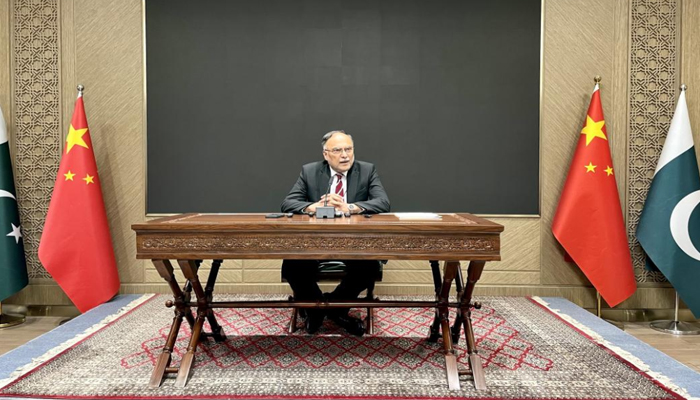ISLAMABAD, Aug 5 (Alliance News): China successfully launched Pakistan’s remote sensing satellite PRSS-01 into space on Tuesday, marking another milestone in the deepening strategic partnership between the two countries.
The satellite was sent into orbit using the Kuaizhou-1A (KZ-1A) launch vehicle from the Xichang Satellite Launch Center in Sichuan Province.
The launch ceremony was closely followed in Islamabad, where Minister for Planning, Development, and Special Initiatives Ahsan Iqbal hailed the event as a historic breakthrough in Pak-China space collaboration.
“With the successful launch of PRSS-01, our all-weather friendship has reached beyond the sky. The Pak-China bond, which we say is higher than the Himalayas, has now become wider and higher than the sky itself,” he said while addressing a media briefing.
Ahsan Iqbal emphasized that space and satellite technology is not just a symbol of scientific advancement but a vital tool for development, particularly for nations like Pakistan that are highly vulnerable to the impacts of climate change.
He highlighted that the PRSS-01 satellite would significantly enhance Pakistan’s ability to monitor environmental changes, natural disasters, and land use across the country.
“The effects of climate change are clearly visible in Pakistan — from deadly floods to rising temperatures. The PRSS-01 will help us better understand and mitigate such crises. This is a major step toward sustainable development through science and technology,” the minister stated.
The PRSS-01 is an Earth observation satellite that will be used for remote sensing purposes, including land mapping, agricultural monitoring, urban planning, disaster management, and environmental protection. With its launch, Pakistan has entered a new era of advanced technological cooperation with China.
Chinese officials at the launch center expressed confidence that the satellite would serve Pakistan well and strengthen bilateral collaboration in space science and technology. The PRSS-01 satellite will be operated by Pakistan’s Space and Upper Atmosphere Research Commission (SUPARCO).
Speaking at the event, Chinese experts said the launch was not just a scientific achievement but a political symbol of the unbreakable friendship between the two countries.
“Pakistan is our iron brother. We are proud to stand with our friends in every field, whether it’s infrastructure, economy, defense, or space,” one senior engineer said.
According to SUPARCO, the satellite has a lifespan of seven years and is expected to deliver high-resolution imagery that will aid multiple sectors.
The data gathered from PRSS-01 will also support national projects such as the China-Pakistan Economic Corridor (CPEC), climate adaptation plans, and security monitoring.
Prime Minister Shehbaz Sharif, in a message shared on social media, congratulated the nation and thanked China for its continued support.
He said the launch of PRSS-01 reflects the government’s commitment to science-led progress and opens the door for future cooperation in aerospace technology.
In recent years, Pakistan has increased its focus on space exploration, particularly through its cooperation with China. In 2018, the two countries jointly launched the first PRSS-1 satellite, followed by the launch of Pakistan’s first communication satellite, PakSat-MM1, earlier this year.
Today’s launch of PRSS-01 signals a strategic shift in Pakistan’s space policy, prioritizing dual-use capabilities for civil and national security purposes.
Experts suggest that the availability of precise remote sensing data will provide Pakistan an edge in disaster response, water resource management, agricultural yield estimation, and regional planning.
Dr. Mujahid Kamran, a space analyst based in Islamabad, said the PRSS-01 will also have indirect benefits for national security. “With border monitoring, strategic resource tracking, and surveillance capabilities, Pakistan can improve its internal security and infrastructure management.”
The Minister for Science and Technology, Dr. Khalid Maqbool Siddiqui, also praised the successful mission.
He said that the PRSS-01 will not only contribute to national development but also inspire young scientists in Pakistan to pursue careers in aerospace engineering and space sciences.
“This is a proud moment. Our youth now see that Pakistan is not just a passive consumer of global technologies — we are creators and partners in global innovation.”
In a symbolic gesture, Pakistani and Chinese flags were raised together at the Xichang launch center, underscoring the deep-rooted trust and cooperation between the two nations.
The launch came at a time when global attention is increasingly turning toward the strategic value of space. Analysts believe this development places Pakistan among the group of countries capable of independently monitoring their terrain and planning more efficiently based on real-time satellite data.
The success of the PRSS-01 mission is also being seen as a diplomatic signal that China remains a strong and committed partner to Pakistan in all fields, including cutting-edge technology and scientific innovation.
As the satellite begins transmitting data, government departments, universities, and private sector entities will begin integrating this information into their operations.
Training programs are also being planned to enhance the country’s ability to interpret satellite data and apply it for developmental purposes.
In closing remarks, Ahsan Iqbal reiterated Pakistan’s commitment to leveraging science and technology for national development. He said Pakistan would continue to deepen its partnership with China to develop indigenous capabilities in the space domain.
“Today’s success is a window into tomorrow’s potential. We look forward to further cooperation with China in the peaceful uses of outer space and thank them for walking with us on this journey to the stars.”






